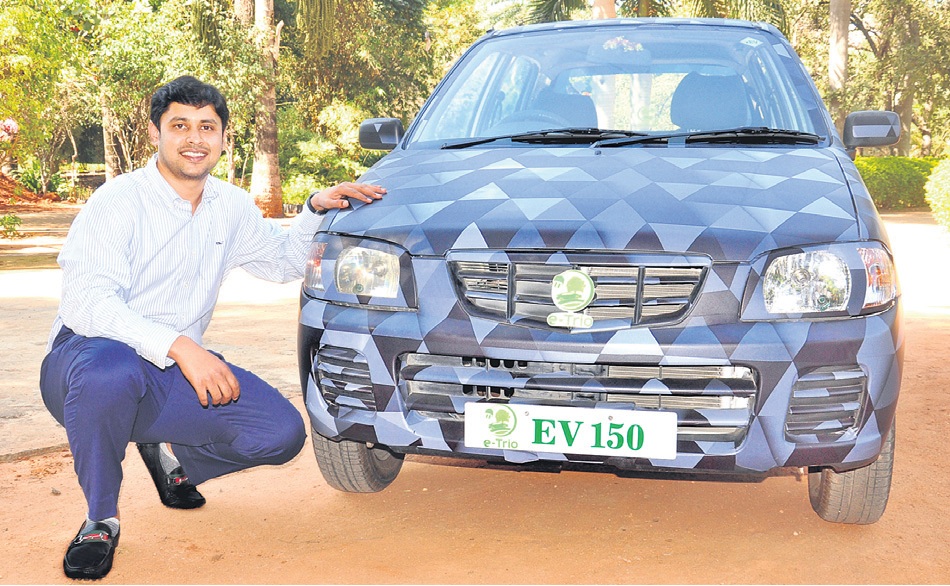City-based Gayam Motor Works (GMW), which rolled out its first EV in 2015 and counts BigBasket, Uber, IKEA, Grofers, Gati-KWE, GHMC, GVMC and Central American Police as clients, plans to ramp up capacity to 1,500-2,000 units per month by the end of next year. GMW currently churns out around 150 EVs per month.
Hyderabad: Even as the Telangana government hunts for that one big name in the electric vehicle (EV) space that can help fire up the EV ecosystem in the state, many local players are revving up their game to cater to the growing demand for green mobility.
City-based Gayam Motor Works (GMW), which rolled out its first EV in 2015 and counts BigBasket, Uber, IKEA, Grofers, Gati-KWE, GHMC, GVMC and Central American Police as clients, plans to ramp up capacity to 1,500-2,000 units per month by the end of next year. GMW currently churns out around 150 EVs per month.
“Most of our existing B2B customers in the logistics space have placed repeat orders with us to scale up their operations. They have been able to bring down their running costs from Rs 4/km to Rs 0.50/km by replacing diesel vans with our electric autos. We are looking to raise a $20 million via Series A funding to automate and increase our production capacity to meet the increasing demand,” GMW chief operating officer Harsha Bavirisetty said.
Another city-based EV player, E-trio Automobiles, which assembles and sells retrofitted car kits that can transform Alto, Desire and Wagon R into EVs, is now looking at upgrading to making e-rickshaws and is also looking at enhancing the capacity of its Bolarum factory, which it can integrate up to 1,000 EV kits per annum, to 10,000 EV kits per annum next year.
photo courtesy: TelanganToday
E-trio, which claims Automotive Research Association of India (ARAI) approval for the retrofitted car kits, currently sources the retrofitted kits from China and Korea and fits the controller, which has been developed in-house, “Apart from launching kits for seven more passenger car models, we plan to launch economical auto rickshaws with a range of 200 km per charge,” E-trio Automobiles founder Sathya Y said.
Last week, KETO, a joint venture between Hyderabad-based ETO Motors Pvt Ltd and Hong Kong-based KYTO Green Technologies Limited, announced that it will be investing around $10 million in the next two years to set up a 50,000 units per annum EV manufacturing plant and R&D facilities in India.
Olectra Greentech (formerly Goldstone Infratech Ltd), which started manufacturing electric buses in tie-up with China’s BYD Auto Industry Co Ltd in 2016, plans to ramp up capacity at its Jadcherla plant from 2,100 units to 5,000 units per annum by end of 2021, said a company’s spokesperson.
The company bagged bids for supplying 290 e-buses from state transport undertakings in Bengaluru, Mumbai and Hyderabad in August this year.
Sensing the rising demand for green vehicles, the Telangana government too is in talks with a couple of global and domestic EV manufacturers who are keen on setting up their units in the state, said Telangana industries principal secretary Jayesh Ranjan.
While the state has been trying to woo manufacturers to set up shop in the state, it has also been encouraging various entities to create support infrastructure for EVs like charging stations.
In June, Hyderabad Metro Rail Limited (HMRL) along with partners like Larsen & Toubro (L&T) and Power Grid Corporation of India Ltd (PGCIL) announced that it will be setting up EV charging infrastructure at metro stations in the city.
In July this year, IndianOil joined hands with Finnish energy player Fortum to set up two charging stations at its outlets in Hyderabad. The two companies intend to set up 50 charging stations in the city in the near-term.
As the infrastructure slowly gathers pace, there are about 200 EVs plying on the roads in the Telangana.
And to charge them up, the Telangana State Electricity Regulatory Commission had last month fixed the tariff for EV charging stations at Rs 6 per unit.





